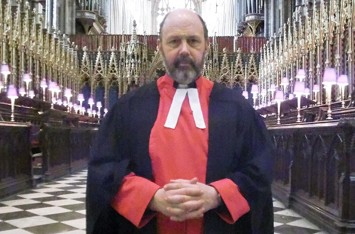Wright, 71, does not fit neatly into the oversimplified categories often used to describe American Christianity: liberal versus conservative, mainline versus evangelical. Over his career, he has won the admiration of those who follow what they describe as orthodox teachings, but he has also called on Christians to more actively seek out opportunities to lift up the poor and the marginalized. In addition, he’s quite familiar with the religious and political environment of the United States, having spent significant time in the country over the years. But while Wright is ultimately a foreign observer from across the pond, the problems he sees in America are distinct but not altogether dissimilar from the problems he sees in Britain: He believes most people have no framework to help them navigate a time of political turmoil and division. Without the guiding story of Christianity, he says, conflict and moral confusion proliferate.
In November, on the eve of Wright’s retirement—or semiretirement, because he just got a plum gig at Oxford, and he’s not likely to stop writing anytime soon—I met him for lunch in New York City. He’s an amiable fellow, balding and mostly gray through the beard, who’s given to cracking self-deprecating jokes about how his children and grandchildren don’t take him seriously. We discussed the crisis of American Christian identity and the decline of Western morality as we ate—light conversational fare for a theologian and pastor. Our conversation, below, has been edited for length and clarity.
Emma Green: Do you worry that the strong association between Christianity and politics in the United States—and specifically the alignment between the religious right, evangelicals, and the Republican Party—will permanently shape the image of Christianity?
N. T. Wright: Part of the problem here is the word evangelical. I know a lot of people who have basically abandoned it since the whole [Donald] Trump phenomenon.
In England, people are a bit embarrassed about the word. But I’ve taken the view that the word evangelical is far too good a word to let the crazy guys have it all to themselves, just like I think the word Catholic is far too good a word for the Romans to keep it all to themselves. And while we’re at it, the word liberal is too good a word for the skeptics to have it all for themselves. It stands for freedom of thought and exploration.
Everything gets bundled up together, whether it’s abortion or gun rights or homosexuality or whatever. All issues are seen as either you’re on that side, and it’s the whole package, or you’re on this side, and it’s the whole package.
[Read: Why some Christians ‘love the meanest parts’ of Trump]
Green: Do you think most Christian leaders, especially in the U.S., operate primarily from a place of fear about being pushed out of the culture?
Wright: That’s a good question. I do not know. There are many places where people are quite upbeat, and where Christian leaders are seeing God doing great things in their communities. And there is fear, because some huge cultural imperatives can’t fit with the Church’s traditional teaching.
Green: What cultural imperatives are you talking about?
Wright: Well, one would name the LGBT agenda. For 2,000 years, Christian, Jews, and Muslims—Muslims for less than 2,000 years, but you know what I mean—have just said, That’s not what we think a human life is all about. Suddenly, we have a cultural imperative [to embrace LGBT identity] coming in the last 30 years or so. That’s quite an extraordinary thing.
 Wright prays in London’s Westminster Abbey in 2003.
Wright prays in London’s Westminster Abbey in 2003.
Green: I think the LGBT issue is a major tension point in people’s perceptions of Christianity, or at least conservative expressions of it. On this issue, people seem to feel that Christianity’s messages are primarily about judgment and condemnation.
So a lot of people, particularly the women, found the Christian ideal of chastity amazingly refreshing.
Green: But if you’re talking to young people today, and you’re trying to introduce them to what Christianity is, they may say, “Okay, fine and well, in the horrible world of ancient Christianity, where it was a terrible thing to be a woman, sure, I can see the case for a restricted sexual ethic. But we live in a different time now.” How do you bridge that divide, and address the pain people feel?
Wright: With constant difficulties. The primary means of communication of the Gospel, I think, is through the communities that are living it, and by people saying, “Wow, that’s interesting. They seem like really nice people, what is it about them, and they were so helpful when the baby was sick, and we just like having them as neighbors.” And then it turns out it’s because they’re followers of Jesus.
It’s in that context that it makes sense to talk about Jesus. Part of the trouble is that we’ve lived in a split world. People talk about this heavenly Jesus, who may be a savior and will come down and rapture us or whatever, but he doesn’t have muddy feet: He doesn’t live in our world. He isn’t weeping with those who weep on the ground now. Followers of Jesus are called to be those who, as Paul says in Romans 12, rejoice with those who rejoice and weep with those who weep.
Green: Do you feel hopeful about the future of Christianity?
Wright: Yeah, of course I feel hopeful. Lesslie Newbigin—does that name mean anything to you? He was a Presbyterian who went out to India as a missionary.
Somebody once asked him whether he was an optimist or a pessimist, and he said, “I’m neither an optimist nor a pessimist; Jesus Christ has risen from the dead.” In other words, something has happened, as a result of which the world is a different place. If we put our faith only in a Western Enlightenment version of the spread of Christianity, how foolish would we be? Christianity is thriving in Africa and Asia—in China, for goodness’ sake. It’s amazing, actually.
[Read: The tiny blond Bible teacher taking on the evangelical political machine]
Green: Looking to America and Britain to be the future of Christianity—you think that’s misguided?
Wright: Who knows? You know, God is the God of surprises. New things can happen; new things should happen. But there are more Anglicans in church in Nigeria on a Sunday than in the whole of Britain and America put together.
Green: If you were talking to a young person who feels anguish about what Christianity has come to mean in America, what would you say to him or her?
Wright: For goodness’ sake, read the four Gospels. That’s what they’re there for. And recognize that in the prayer Jesus taught us to pray: “Forgive us our trespasses.” You don’t just say that once, at the beginning of your Christian life. You jolly well say it every day, because you will need to. The trouble is that the Church is far too good at hoping that everyone else will be asking for forgiveness for their trespasses. Self-critique is part of the Gospel. And where the Church forgets that—oh boy, things go badly wrong.
Green: In the United States, a lot of people would say that religion has a major role in politics. Is that a good thing?
Wright: The thing is, the New Testament is a wonderfully, gloriously rich political book. Read the Book of Acts. Paul and the others are always telling the magistrates they are getting things wrong. And, of course, the magistrates don’t like it, and Paul’s been beaten up illegally, and he’s been imprisoned. There’s an earthquake and the walls fall down, and the jailer is about to commit suicide, gets converted, and the next morning, the magistrate is sent to the prison to say, “Tell these guys to get out of town.” And Paul says, “Roman citizen, beaten without trial, imprisoned without charge—sounds like a public apology is necessary.” And Paul gets the apology.
I love that. It’s not a way of winning friends and influencing people. But it is a way of saying we serve a God who’s in charge here. And in his name we are holding you to account for what you know perfectly well you ought to be doing.
It’s easier for me to say this, you know, in semiretirement. I’m gonna put my feet up and listen to Beethoven and tell my grandchildren, “It’s over to you now.”
Green: Don’t you think that’s one of the joys of semiretirement—you get to tell everybody else what they should be doing from the comfort of an armchair?
Wright: Possibly. The frustrating thing is, I’m sure my grandchildren just listen to me and think, Yeah, yeah, that’s Grandfather speaking. And I just hate that by the time they’re in their 20s they will have realized, actually, Grandfather had one or two things to say.
We want to hear what you think about this article. Submit a letter to the editor or write to letters@theatlantic.com.


